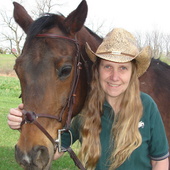Naturally Controlling Insects On Your Horse Farm
Spring has arrived and summer is just around the corner. With the nicer, warmer weather come various insects such as horse flies, mosquitos, gnats (or no-see-ums), house flies, and many, many more. It seems as though the insects are attracted to farms, horses and livestock, creating a nuisance to all living creatures.
There are ways that the insects can be controlled. Many chemicals can be found for insect control, but with animals around, it is best to stay away from these. Plus, it is better for the environment if the chemicals are not used.
So how can they be controlled?
Some insects tend to lay their eggs in manure. Therefore, the manure should be picked up on a daily basis in the stalls, paddocks and other turnout areas. The manure can then be either spread over fields, where the sun will kill any eggs, put in a pile somewhere on the farm away from the barn for composting, or have the local farmer haul it away. (Pennsylvania requires that all properties, large and small, have a written manure management plan. It doesn't matter how many horses or livestock are housed on the property, it is required.)
Insect traps may be placed in the outer perimeters of the property and fenced turnout areas for the horses and animals. This will lure the insects away from the area the horses are kept.
Fly paper can be hung up in the barn and out buildings to catch whatever insects and flies are in the buildings.
Fly predators are flies that can be purchased that feed on fly eggs. These fly predator eggs are sent monthly to you, then you scatter them in the manure pile, where they hatch feeding on the fly eggs. This does reduce the fly population.
Attracting bats and birds to the property will help greatly. Since they feed on insects, create a natural habitat for them. The birds will feed on them by day and the bats by night. Great way to reduce the insect population on the farm and enjoy the beauty and songs of the birds.
Dispose of any standing water on the property. Standing water attracts mosquitoes, where they lay eggs. If using stock tanks as watering sources, change the water regularly so the eggs do not have a chance to hatch.
Instead of using poisonous chemicals to rid the horse farm of pesty insects, try the natural options of controlling them. It is a much healthier and better way in more ways than one.






Comments(2)